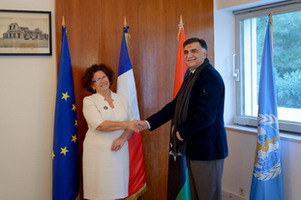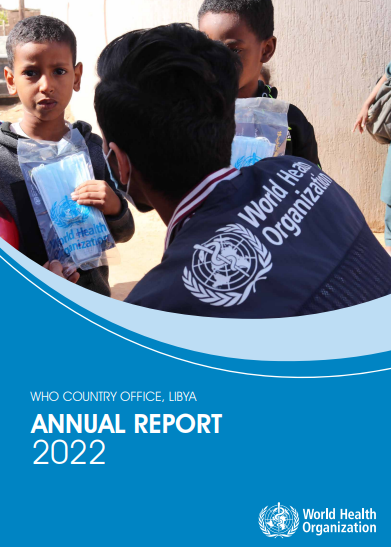 Ms Brigitte Curmi, French Ambassador to Libya, and Dr Jaffar Hussain, WHO Representative to Libya17 December 2017 – The Government of France and the World Health Organization have recently mutually signed a donation accord for a WHO project to address the immediate needs of extremely vulnerable people in south of Libya. The goal of the project is to save lives of under-served population by providing live-saving medicine to health facilities in Sabha, Ubari and Al Kufra of Libya.
Ms Brigitte Curmi, French Ambassador to Libya, and Dr Jaffar Hussain, WHO Representative to Libya17 December 2017 – The Government of France and the World Health Organization have recently mutually signed a donation accord for a WHO project to address the immediate needs of extremely vulnerable people in south of Libya. The goal of the project is to save lives of under-served population by providing live-saving medicine to health facilities in Sabha, Ubari and Al Kufra of Libya.
The Accord is covering the period from 1 December 2017 to 31 May 2018. During the 6 months, it is expected to improve access to essential and emergency health care for the vulnerable population in the target areas. Through ensuring procurement and distribution of 80 Inter-Agency emergency health kits (IEHK), IEHK 2015 supplementary module and NCD kits in addition to procurement and supply of essential diagnostic tools to the target hospitals and primary health care centres.
This is the second donation accord between WHO and the Government of France to support health supplies procurement for underserved areas in Libya.
A previous agreement has concluded in February this year. By the end of the project, 1400 injured internally dispalced persons had benefited from trauma kits donated by WHO, and another 60 000 patients had benefited from IEHKs. Only 5 public health facilities were functional in September 2016 in Misurata at the beginning of the project. By March 2017, however, 3 additional health facilities were up and running.
“WHO expresses appreciation for the Government of France on the continued support and financial contribution that make the improvement of the health status of the Libyan population in underserved areas possible, and acknowledges the efforts exerted to support health intervention for the vulnerable population,”Dr Sayed Jaffar Hussain, WHO Representative and Head of its mission in Libya said.
“France believes it is critical to support provision of essential health services to vulnerable population in remote and deprived areas especially in the South of Libya; and that WHO as a trusted partner, is best positioned to extend that support,” said Ms Brigitte Curmi, French Ambassador to Libya.





 Libya country office annual report, 2022
Libya country office annual report, 2022
